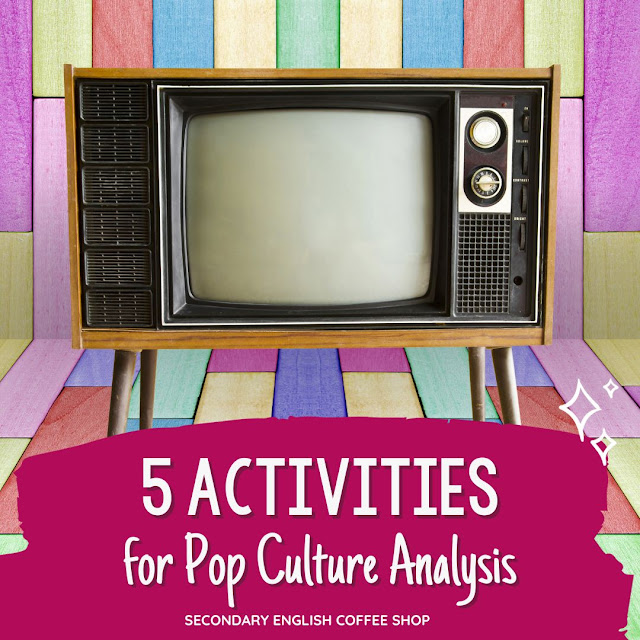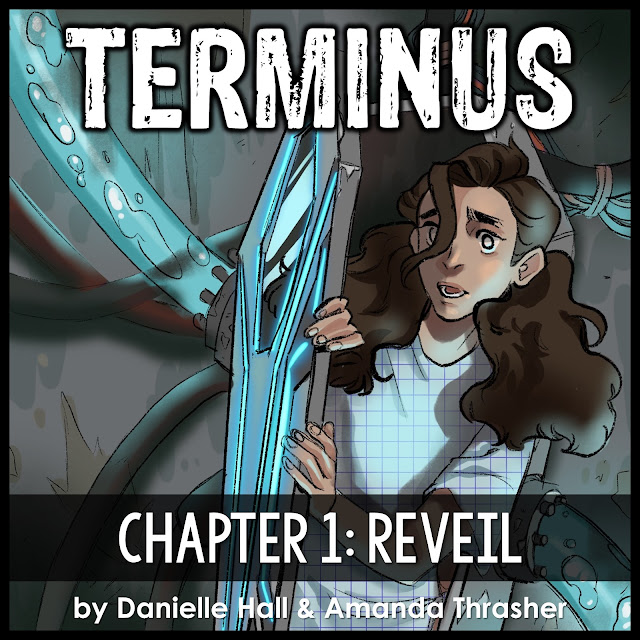Using pop culture analysis in Secondary ELA can be a great way to leverage alternative text types and hook students’ attention. Using songs, video games, short films, and TV episodes in ELA means that students build their analysis skills on stuff they’re already interested in.
Here are five lessons I LOVE from my collection, Mixed Media: 15 Pop Culture Lessons. I’ll keep it short-and-sweet in this blog post, but the full resource includes full summaries, editable lesson plans, bell ringers, and extension ideas.
Horizon Zero Dawn opening scene (video game)
Characterization
Setting
Making Inferences
The opening scene to the video game is not only great for its stunning graphics, but also for its intriguing character, setting, and thematic development…and all in a span of 5 short minutes! Even though the scene does not answer all of our questions, it provides students with plenty to analyze. Students can analyze minor details, like Rost humbly kneeling to the robotic machines, or major details, like the revealing dialogue between the fighting matriarchs. Students are guaranteed to find new details with every watch!
“Lock Up” (short film)
Horror techniques
Building suspense
Analyzing film (camera angles, etc.)
In “Lock Up,” we have the gamut of horror techniques in a three-minute short film. We open on a nameless office worker about to lock up for the evening and go home to his wife and kids. He ends a quick phone call to his wife by promising to be home soon. He methodically locks every door, but keeps having “that feeling” that someone’s in the building. Every little noise is making him jumpy. At the end, a masked figure is revealed who murders him.
Okay, I don’t like horror. At all. But! I do see the artistic value in it, I guess. If you like horror and you want to show some to your class, this is a great catch-all for horror-isms.
Terminus, chapter 1: Reveil (digital escape game)
Making Inferences
Suspense
Found texts
When you walk by, do your students switch from their “super secret” gaming tabs to their “super efficient” schoolwork tabs? Yeah, mine too. But what if you gave them a game to play that is actually standards-aligned and rigorous?
Terminus is a four-part digital adventure series geared towards 8th and 9th grade students who read below level. This story is a post-pandemic, found-text adventure. Playing as Rania, students work to solve the mystery of the MILSA outbreak by reading letters, memos, manuals, and emails left behind. Each game has puzzles and riddles that engage students in collaboration and critical thinking.
“The Rashomon Job” - Leverage (TV episode)
Narrative Structure
Humor
Suspense
Leverage is a heist show with a different “job” each episode. Our team of criminals are Robin Hood-types, of course, using their amazing crime skills to take down the bad guys. In this episode, each of our team members recount a crime five years earlier (before they knew each other), when they all stole the same piece of art… sort of.
If you’re not familiar with Rashomon, you really don’t need to be in order to enjoy this episode. The core concept is that the story changes with each narrator. In the case of our team, each person remembers the event sliiiightly differently, and it’s not until the last telling that it all comes together.
Rhetorical Appeals (Ethos, Logos, Pathos)
Flattery
Have you watched Disney’s 2023 version of The Little Mermaid? If you haven’t yet, it is an adorable adaptation with MUCH more diversity and inclusivity. The storyline stays predominantly the same, so for this activity, you can use either version.
If you need a refresher, Ariel, a mermaid, has a strict father, King Triton, who prohibits her curiosity and exploration of humans. However, this does not stop her. One night above the sea, a storm causes a ship to crash and nearly drowns a human, Prince Eric. After Ariel saves him, her desire to be “where the people are” grows astronomically.
Enter “Poor Unfortunate Souls.” Ursula, the conniving Sea Witch, sees Ariel’s vulnerabilities and uses her mighty persuasiveness to take advantage of the moment. This song is rich with rhetorical appeals. Your students will have so much fun dissecting a familiar song with an analytical lens.
This activity focuses specifically on ethos, pathos, logos, and flattery. There are certainly other persuasive techniques you can include too. Students will practice transferable skills like close reading, annotating, collaborating, and analyzing from different perspectives.
If you teach this lesson, I am sure you’ll notice your students’ engagement levels skyrocket! The best part? These pop culture analysis activities prep your students with the skills they need to be critical readers of the world.
Your students will thank you and ask to do more!
Happy teaching, friends!
- Danielle
👉🏻 WANT MORE MEDIA LITERACY IDEAS AND RESOURCES? Here are some of my favorites FROM MY FRIENDS AT THE COFFEE SHOP:
- Making Inferences on Social Media by Presto Plans
- Editable Classroom Memes Posters by Tracee Orman
- 5 Ways to Incorporate Pop Culture Into Your ELA Class by The Classroom Sparrow







.JPG)





